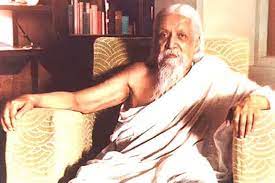Sri Aurobindo, a versatile philosopher, poet, mystic, and revolutionary, embarked on a profound spiritual journey that transformed his life and left an enduring impact on the world. Born on August 15, 1872, in Calcutta, India, he would become a prominent figure in the Indian freedom movement and a trailblazer in the realm of spiritual exploration. His life’s trajectory was woven with threads of bravery, introspection, and an unyielding pursuit of higher consciousness.
Early Years and Education:
Sri Aurobindo’s early life was marked by academic brilliance and a curious mind. He displayed exceptional talents in various domains, including poetry, literature, and languages. His father, Dr. Krishna Dhun Ghose, played a significant role in nurturing his intellectual pursuits. Aurobindo’s educational journey led him to King’s College, Cambridge, where he excelled in studies and was recognized for his literary prowess.
Political Awakening and Patriotism:
Upon returning to India, Aurobindo delved into the political landscape, driven by a desire to see his homeland free from British colonial rule. He joined the Indian National Congress and passionately advocated for India’s independence. His writings and speeches resonated deeply with the masses, igniting a sense of nationalistic fervor.
Aurobindo’s involvement in the political arena culminated in his editorship of the nationalist newspaper “Bande Mataram.” Through his passionate and evocative articles, he inspired a generation of Indians to rise against oppression and work towards a self-reliant India.
Transformational Spiritual Journey:
Amidst his political activism, Aurobindo’s life took a transformative turn when he began to explore spirituality and mysticism. His encounters with spiritual teachers and his own profound experiences awakened a deep yearning for spiritual realization within him. This marked the onset of his intense exploration of Eastern and Western spiritual philosophies.
A pivotal moment arrived when Aurobindo retreated to Pondicherry, a French colony, in 1910. Here, in seclusion, he immersed himself in the practice of Integral Yoga—an all-encompassing path that seeks to harmonize the physical, mental, and spiritual dimensions of human existence. Aurobindo’s Integral Yoga emphasized the evolution of consciousness and the integration of the divine within daily life.
Synthesis of Eastern and Western Thought:
Sri Aurobindo’s distinctive contribution to spiritual thought lay in his ability to synthesize Eastern and Western philosophies. He drew insights from ancient Indian scriptures, such as the Upanishads, Vedas, and Bhagavad Gita, as well as Western thinkers like Friedrich Nietzsche and Henri Bergson. This fusion of diverse philosophies enriched his understanding of human existence and the path to spiritual realization.
Mother Mirra Alfassa: Collaborator and Spiritual Partner:
A significant chapter in Sri Aurobindo’s life unfolded with the arrival of Mirra Alfassa, later known as “The Mother.” Their collaboration and shared vision were instrumental in shaping the Sri Aurobindo Ashram—an experimental community devoted to the practice of Integral Yoga and the realization of a new consciousness. The Mother played a pivotal role in guiding spiritual seekers within the Ashram and nurturing an environment of spiritual growth.
The Concept of Supramental Consciousness:
One of Sri Aurobindo’s most profound contributions was his exploration of the supramental consciousness—a higher plane of awareness beyond the limitations of the human mind. He envisioned a future where humanity would evolve towards this supramental consciousness, transcending the inherent suffering and limitations of ordinary existence. This concept continues to inspire spiritual seekers and philosophers worldwide.
Legacy and Influence:
Sri Aurobindo’s legacy extends far beyond his physical lifetime. His writings, which encompass philosophical treatises, poetry, and letters, offer profound insights into the nature of existence, consciousness, and the path to spiritual realization. The Sri Aurobindo Ashram, founded by him in Pondicherry, remains a vibrant center of spiritual practice and study.
Furthermore, Aurobindo’s teachings have influenced a diverse range of fields, from psychology to education, and continue to inspire individuals seeking to navigate the complexities of modern life while nurturing their inner growth.
Conclusion:
Sri Aurobindo’s life journey encapsulated a remarkable fusion of political activism and spiritual exploration. His unwavering commitment to both India’s freedom struggle and the pursuit of higher consciousness exemplifies the interconnectedness of the material and spiritual dimensions of human existence. Aurobindo’s legacy invites us to embark on a profound inner journey, transcend limitations, and strive for a harmonious evolution of both individual and collective consciousness. His life stands as a testament to the boundless potential of the human spirit and its ability to bridge the gap between the finite and the infinite.
bhalakatha
prayas
mind plugin
#bhalakatha #prayas #MindPlugin





